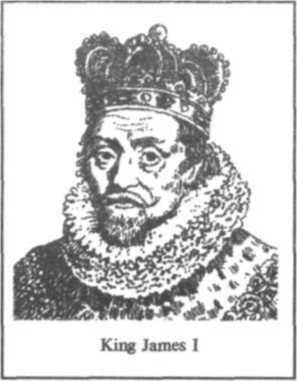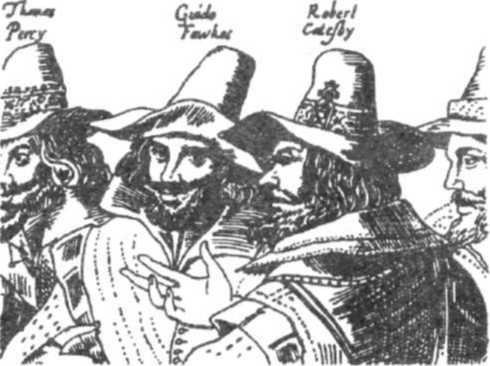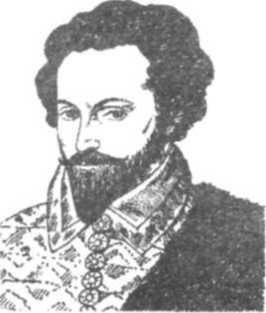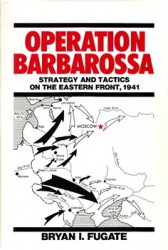
Elizabeth's "cousin of Scotland" was ugly, awkward, and shutting both in mind and person. His figure presented a most ridiculous appearance, dressed in thick padded clothes, as a safeguard against being stabbed (of which he lived in continual fear), of a grass-green colour from head to foot, with a hunting-horn dangling at his side instead of a sword, and his hat and feather sticking over one eye, or hanging on the back of his head. He used to loll on the necks of his favourite courtiers, and kiss and pinch their cheeks; and the greatest favourite he ever had used to sign himself in his letters to his royal master, His Majesty's "dog and slave".
His Majesty was the worst rider ever seen, and thought himself the best. He was one of the most impertinent talkers ever heard, and boasted of being unanswerable in all manner of argument. He wrote some of the most wearisome treatises ever read — among others, a book upon witchcraft, and thought himself a prodigy of authorship. He thought, and wrote, and said, that a king had a right to make and unmake any laws he pleased, and ought to be accountable to nobody on earth.
He came to the English throne with great ease, and was accepted by the nation, even without being asked to give any pledge that he would govern well. He took a month to come from Edinburgh to London, and, by way of exercising his new power, knighted everybody he could lay hold of. He made two hundred knights before he got to his palace in London, and seven hundred before he had been in it three months. He also shovelled sixty-two new peers into the House of Lords — and there were many Scotchmen among them.
His prime Minister Cecil was the enemy of Sir Walter Raleigh, and also of Sir Walter's political friend, Lord Cobham; and James's first trouble was a plot originated by these two, and entered into by some others, with the old object of seizing the King and keeping him in imprisonment until he should change his ministers.
There were Catholic priests in the plot, and there were Puritan noblemen too. Though the Catholics and Puritans were strongly opposed to each other, they united at this time against the King, because they knew that he had a design against both, after pretending to be friendly to each. This design was to have only one high and convenient form of the Protestant religion, which everybody should be bound to belong to, whether they liked it or not. This plot was mixed up with another, which may or may not have had some reference to placing on the throne, at some time, the Lady Arabella Stuart, the daughter of the younger brother of the King's father, who, however, was quite innocent of any part in the scheme. Sir Walter Raleigh was accused on the confession of Lord Cobham, a miserable creature, who could not be relied upon. The trial of Sir Walter Raleigh lasted from eight in the morning until nearly midnight. He defended himself with eloquence and spirit against all accusations, but was found guilty, nevertheless, and sentenced to death. Execution was deferred, and he was taken to the Tower.
Soon it was comfortably settled that there was to be only one form of religion, and that all men were to think exactly alike. But, although this arrangement was supported by much fining and imprisonment, it was not quite successful.
Having uncommonly high opinion of himself as a king, James had a very low opinion of Parliament as a power that wanted to control him. He called his first Parliament after he had been king a year, and told them that he commanded them "as an absolute king." The Parliament thought those strong words, and saw the necessity of upholding their authority.
James I had three children: Prince Henry, Prince Charles, and the Princess Elizabeth. It would have been well for one of these if he had learned a little wisdom concerning Parliaments from his father's obstinacy.
This Parliament revived and strengthened the severe laws against the Catholics. And this angered a Catholic gentleman, Robert Catesby by name, so much, that he formed a scheme known as the Gunpowder Plot.
His object was to blow up the King, lords, and commons at the next opening of Parliament. The first person to whom he confided this horrible idea was Thomas Winter, who had served in the army abroad, and had been secretly employed in Catholic projects. Winter went over to the Netherlands, and at Ostend he met Guido — or Guy — Fawkes, whom he had known when they were both soldiers abroad. Winter told Fawkes about Catesby's plan, and they both decided to join the plot, and came back to England together. Here, they admitted two other conspirators: Thomas Percy and John Wright, both related to the Earl of Northumberland. All these

Guido Fawkes, Thomas Percy and Robert Catesby forming a scheme known as the Gunpounder Plot
Met together in a solitary house, and Catesby told the rest what his plan was.
As Percy had occasional duties to perform about the Court, then kept at Whitehall, there would be nothing suspicious in his living at Westminster. So, having found a house to let, the back of which joined the Parliament House, he hired it for the purpose of undermining the wall. Having got possession of this house, the conspirators hired another one, which they used as a storehouse for gunpowder that was to be gradually carried at night to the house at Westminster.
It was a dark wintry December night, when the conspirators met in the house at Westminster, and began to dig. The wall was very thick, and they had to dig by night and by day, and Fawkes stood sentinel all the time. And if any man's heart seemed to fail him at all, Fawkes said,
"Gentlemen, we have a lot of powder here, and there is no fear of our being taken alive, even if discovered." The same Fawkes soon learned that the King had prorogued the Parliament again, from the seventh of February, the day first fixed upon, until the third of October. When the conspirators knew this, they agreed to separate until after the Christmas holidays, and the house in Westminster was shut up again.
It was the beginning of February, 1605, when Catesby met his fellow-conspirators again at this Westminster house. He had now admitted three more — John Grant, Robert Winter, eldest brother of Thomas, and Catesby's own servant, Thomas Bates, who, Catesby thought, had had some suspicion of what his master was doing. And now, they all began to dig again, and they dug and dug by night and by day.
They found it dismal work alone there, underground, with such a fearful secret on their minds, and so many murders before them. They were filled with wild fancies. Sometimes, they thought they heard a great bell tolling, deep down in the earth under the Parliament House; sometimes, they thought they heard low voices muttering about the Gunpowder Plot. Once in the morning, they really did hear a great noise over their heads. They stopped and looked at each other, wondering what had happened, when Guy Fawkes, who had been out to look, came in and told them that it was only a dealer in coals who had occupied a cellar under the Parliament House, removing his stock in trade to some other place. Upon this, the conspirators, who with all their digging and digging had not yet dug through the tremendously thick wall, changed their plan. They hired that cellar, which was directly under the House of Lords, put thirty-six barrels of gunpowder in it, and covered them over with fagots and coals. Then they all dispersed again till September, when the following new conspirators were admitted, Sir Edward Baynham, Sir Everard Digby, Ambrose Rookwood and Francis Tresham being among them. Most of these were rich, and were to assist the plot, some with money and some with horses on which the conspirators were to ride through the country and rouse the Catholics after the Parliament should be blown into air.
Parliament was again prorogued from the third of October to the fifth of November. Thomas Winter said he would go up into the House of Lords on the day of the prorogation, and see how matters looked. Nothing could be better. The unconscious Commissioners were walking about and talking to one another, just over the thirty-six barrels of gunpowder. He came back and told the rest so, and they went on with their preparations. They hired a ship, and kept it ready in the Thames, in which Fawkes was to sail for Flanders after firing with a slow match the fagots that ware to explode the powder. A number of Catholic gentlemen not in the secret were invited, on pretence of a hunting party, to meet Sir Everard Digby at Dunchurch on the fatal day, that they might be ready to act together. Everything seemed to be ready.
But, now, the great danger which had been all along at the bottom of this plot, began to show itself. As the fifth of November drew near, most of the conspirators, remembering that they had friends and relations who would be in the House of Lords that day, felt a wish to warn them to keep away. They were not much comforted by Catesby's declaring that in such a cause he would blow up his own son.
Lord Monteagle, Tresham's brother-in-law, was certain to be in the house. So Tresham wrote a mysterious letter to his relative, urging him to keep away from the opening of Parliament. It contained the words: "the Parliament should receive a terrible blow".
Lord Monteagle showed the letter to the King and his ministers, and it was decided to let the conspirators alone, until the very day before the opening of Parliament.
In the afternoon of the fourth of November GUY Fawkes was keeping watch in the cellar as usual. At about two o'clock the Lord Chamberlain and Lord Monteagle threw open the door and looked in. "Who are you, friend?" said they. "I am Mr. Percy's servant," said Fawkes, "and I am looking after his store of fuel here." The lords looked at each other, shut the door, and went away. Fawkes was left alone.
After midnight he slowly opened the door, and came out to look about him. He was instantly seized by a party of soldiers. He had a watch upon him, some touchwood, and some slow matches, so his intentions were absolutely clear.
They took him to the King's bedroom first of all, and there the King asked him how he could have the heart to intend to destroy so many innocent people? "Desperate diseases need desperate remedies," he answered boldly.
Next day Fawkes was carried to the Tower, but would make no confession even under the torture. Other conspirators were less heroic. Tresham, taken and put in the Tower too, made all the necessary confessions. Soon all the conspirators were either arrested or killed.
The trial of Guy Fawkes, and such of the other conspirators as were left alive was held on the fifteenth of January. They were all found guilty, all hanged, drawn, and quartered. A Jesuit priest, named Henry Garnet was said to assist the conspirators. He was arrested, found guilty and executed (the Catholic Church made a saint of him). The result of the Gunpowder plot was, that the Catholics were unjustly put under more severe laws than before.
The King hated his Parliament. But he could not get money without the Parliament, so James I had to order it to meet. When the Parliament, in return, asked him to redress some public wrongs, he flew into a rage. The King was outraged even more, when the Parliament expressed their will to make the laws, while the King considered it to be his priviledge. But as James I could not do without the Parliament, their disputes and quarrels were going on.
The King indulged himself in hunting and drinking. His greatest favourite was Sir Philip Herbert, whom he soon made Earl of Montgomery. Another favourite, Robert Carr, was made Viscount Rochester, and afterwards, Earl of Somerset. Then the King was charmed by George Villiers, who came to Court with all the Paris fashions on him, and could dance very well.
While the King was promoting his favourites, three remarkable deaths took place in England. The first was that of Robert Cecil, Earl of Salisbury. The second was that of the Lady Arabella Stuart, who alarmed James I mightily, by marrying William Seymour, a descendant of King Henry the Seventh, who might strengthen her claim to the throne. At first she was separated from her husband, who was put in the Tower. Then she was also put there, and soon confined in the Tower, where she died Chere after four years of imprisontment. The last, and the most important of these three deaths, was that of Prince Henry, the heir to the throne, in the nineteenth year of his age. He was a promising young prince, and very popular. On the occasion of the preparations for the marriage of his sister the Princess Elizabeth with a foreign prince, he came from Richmond, where he had been very ill, to greet his new brother-in-law, at the palace at Whitehall. There he played a great game at tennis, in his shirt, though it was very cold weather, and was seized with a putrid fever.
Then Sir Walter Raleigh, who had spent twelve long years in the Tower, proposed to resume his sea voyages, and to go to South America in search of gold. The King, divided between his wish to be on good terms with the Spaniards, and the desire to get the gold, did not know what to do. But, in the end, he set Sir Walter free, and Sir Walter fitted out an expedition at his own cost. On the twenty-eighth of March, 1617, he sailed away. The expedition failed and after having returned to England, Sir Walter was once again imprisoned.
The King was disappointed in not getting any gold. Soon it was declared that Sir Walter Raleigh must die under his former sentence, now fifteen years old. On the twenty-ninth of October, 1618, at eight o'clock, after a cheerful breakfast, and a pipe, and a cup of good wine, he was taken to Old Palace Yard in Westminster, where the scaffold was set up, and where so many people gathered to see him die, that it was a matter of some difficulty to get him through the crowd. When he was bent down ready for death, he said to the executioner, finding that he hesitated, "What dost thou fear? Strike, man!" So, the axe came down and struck his head off, in the sixty-sixth year of his age.

Walter Raleigh
The new favourite got on fast. He was made a viscount, he was made Duke of Buckingham, he was made a marquis, he was made Master of the Horse, he was made Lord High Admiral.
He had the whole kingdom at his disposal, and his mother sold all the profits and honours of the State, as if she had kept a shop. He
Blazed all over with precious stones. Yet that gentleman called himself his Majesty's dog and slave, which might please the King.
* * *
James I was driven between the general dislike of the Catholic religion at home, and his desire to flatter it abroad, as his only means of getting a rich princess for his son's wife. The King wanted Prince Charles — who became Prince of Wales after his brother's death — to marry the Spanish King's daughter. But the young Prince fell in love with Henrietta Maria, the French King's sister. Henrietta Maria was to become the Prince's wife, and was to bring him a fortune of eight hundred thousand crowns.
James's eyes were getting red with eagerly looking for the money, when the end of the life came upon him. After a fortnight's illness, on Sunday the twenty-seventh of March, 1625, he died. He had reigned twenty-two years, and was fifty-nine years old.




 World History
World History









